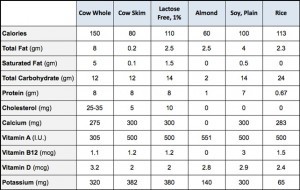What type of milk to drink
Do you drink milk? That's a pretty easy question because it doesn't specify what kind of milk? Most people assume you mean cow's milk but nowadays that question can be open to interpretation as the regular variety or one of rice, almond or soy. So what's the difference between the different types of milk? And more importantly is there one type that you should be drinking?
Below is a table that summarizes the key nutritional differences between the various types of milk. Let's take a look at each.
[caption id="attachment_3527" align="alignleft" width="300"] Nutritional data of different kinds of milk
Almond Milk This is made by crushing almonds with water and as it is not produced with animal products it has little to no saturated fat or cholesterol. Compared to cow's milk it has as little as 40% of the calories and does not contain the sugar lactose. However when drinking almond milk you lose much of the protein, calcium and vitamin B12 found in cow's milk.
Soy Milk This milk is made with soybeans and water and is also produced without animal products therefore is has little saturated fat and no cholesterol. In terms of calories it is comparable to some forms of cow's milk and is almost double the energy of almond milk. In terms of the protein content soy has slightly less than cow's milk and is comparable in terms of the vitamin and mineral content.
Rice Milk Any guesses how rice milk is produced? As with the other two varieties it is made by combining rice (usually brown) with water. Since this form of milk is made from a starch it has a higher carbohydrate content and the highest calorie content of non-dairy types of milk. Again as with the other 2 non-dairy varieties this is a non-animal form of milk so the saturated fat and cholesterol levels are near zero. And while you are getting a higher dose of carbs and total calories from rice milk you are getting almost no protein.
So which milk should you drink? Well this can be decided in a number of ways. Are you concerned about eating as many essential nutrients as possible and having a complete nutritional diet? Or are you eating for ethical reasons? Do your food choices have to do with allergies, disease or some other aspect of health? Because the answers to these should make it fairly clear what type of milk is best for you.
If your choice of milk is based on the most complete nutritional product than cow's milk is the best option. The dose of protein and essential vitamins and minerals can't be beat. And while some of the vitamins and minerals are fortified in other types of milk the best form is always the one where the nutrient occurs naturally. Lastly, there appears to be more evidence coming out indicating that fat and cholesterol in the diet may not be as bad as it was once thought.
If your choice is based on ethical reasons than that is strictly personal. At this point it doesn't matter if a particular variety is more or less nutritional than another if it doesn't align with your ethics. And I'm not hear to debate anyone on that.
If your choice is based on an allergy to lactose you have more choices than in the past. There are now lactose-free versions of cow's milk and all the other varieties described would work for you.
If you are diabetic or someone who is monitoring their carbohydrate and sugar intake. Rice would be your worst option as you get double the amount of carbs compared to cow's milk and almond milk would have the lowest level.
And if you are under the age of two congrats on being able to read this blog. Leave a comment so I can reach out to you personally. That's amazing. But for other young infants it is important they receive a certain level of fat in the diet for proper and complete neural and membrane development. Our brains and nerves are developed with fat and our membranes are called phosolipid to recognize the contribution of fat. So it is vital fat not be purposefully restricted from the diet during the critical developmental years.
Lastly, it is important to recognize that the above table and summary are based upon non-sweetened versions of these milks. As soon as you choose a sweetened variety all bets are off. This changes the nutritional profile by adding more sugar, carbs and calories. And as a quick aside, someone mentioned that chocolate milk is usually the milk that will spoil the soonest as you cannot detect the change in taste when there is bunch of sugar and colouring added to the drink.
Keep these points in mind when deciding what type of milk to drink.
Chris [fb-like]
When you subscribe to the blog, we will send you an e-mail when there are new updates on the site so you wouldn't miss them.

Comments